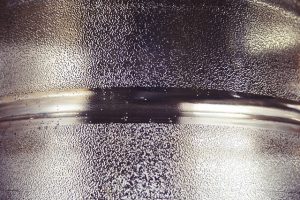
Pure titanium is oftentimes mixed with other metals or chemical elements. Known as titanium alloy, the presence of these additional metals and chemical elements changes its physical properties. Pure titanium itself is relatively strong — about the same strength as steel — but it becomes even stronger when mixed with other metals and chemical elements. Titanium alloy, however, offers other benefits besides increased strength.
What is Titanium Alloy?
Titanium alloy is an alloy consisting primarily of pure titanium with other various metals or chemical elements distributed throughout. It’s produced by mixing a specific ratio of titanium to other metals and chemical elements. Once the ideal ratio has been achieved, the mixture is allowed to cool. The hardened material is then sold, shipped or otherwise used as titanium alloy.
Classifications of Titanium Alloy
While all titanium alloy consists of pure titanium mixed with other metals or chemical elements, there are several classifications of it. Alpha titanium alloys, for instance, are characterized by the use of an alpha stabilizer, such as aluminum or oxygen. Near-alpha titanium alloys, on the other hand, feature a small amount of beta-stage stabilizers.
Like with other commonly used metals and alloys, ASTM International has classification standards for titanium alloy. These standards range from Grade 1 to Grade 38. Grade 1 titanium alloy is the softest and most ductile type, making it easy to manipulate via cold forming metalworking processes. Grade 38 titanium allow, conversely, has a much higher tensile strength. It’s so strong, in fact, that the military uses it to produce armored panels.
Benefits of Titanium Alloy
What are the benefits of titanium alloy exactly? Well, as previously mentioned, there are many different types of titanium alloy, each of which has a different combination and/or ratio of pure titanium to other metals or chemical elements. Therefore, the benefits of titanium alloy vary depending on the specific type. With that said, most types of titanium alloy share a few common characteristics that make them an attractive choice.
Titanium alloy has high tensile strength. Pure titanium is stronger steel, but when the right metals or chemical elements are mixed with it, it becomes even stronger. As a result, titanium alloy is frequently used in applications that require an exceptionally strong material.
In addition to being strong, titanium alloy offers a high level of protection against corrosion. Many types of titanium alloy are coated in a thin layer of oxide. The presence of this oxide forms a barrier that protects the underlying metals from corrosion.
